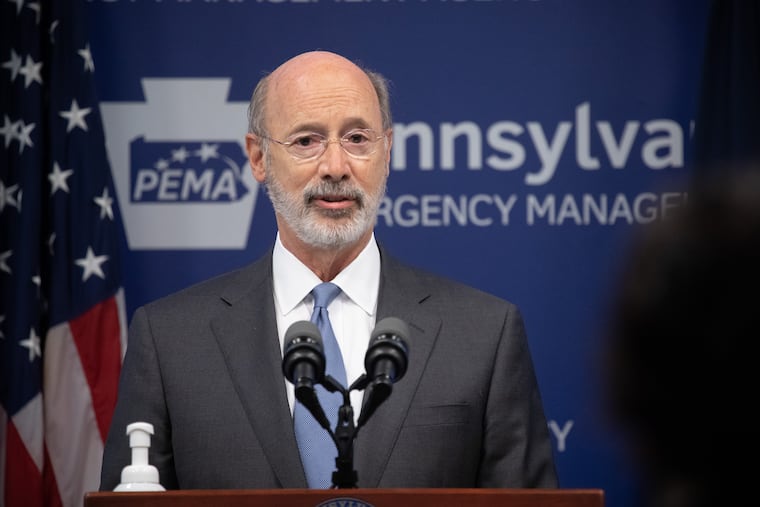Proposed change to Pa. rules of declaring a disaster may endanger emergency food stamps, advocates say
Advocates say that the Republican-controlled legislature, which has battled with Gov. Tom Wolf on his handling of the pandemic, would end Wolf’s ongoing COVID-19 disaster declaration.

Some of the poorest people in the state of Pennsylvania could lose hundreds of millions of dollars in food stamps if two amendments on next month’s primary election ballot get passed, according to Wolf administration officials, as well as local and national anti-hunger advocates.
The proposed amendments, championed by the Republican majority in the General Assembly, would give state lawmakers the power to unilaterally terminate disaster declarations and limit declarations to just 21 days, instead of the normal 90.
Currently, the governor is in charge of decisions to declare, terminate, and renew a disaster declaration. Since last March, Gov. Tom Wolf has renewed the COVID-19 emergency order three times, most recently in November.
Advocates and others fear that the Republican-controlled legislature, which has battled with Wolf on his handling of the pandemic, would end Wolf’s ongoing COVID-19 disaster declaration. That could trigger a cascade of events that might terminate the flow of emergency food-stamp benefits from the U.S. Department of Agriculture, which has supplied the state with $100 million a month since March 30 — a total of about $1.3 billion, advocates say.
Further, advocates worry that an amendment requiring a disaster declaration to have to be renewed every 21 days is impractical, especially during a pandemic. “It’s hard to plan running a program tied to emergency declaration if they operate it in three-week cycles, not knowing if it’s going to be renewed,” said Ann Sanders, public policy advocate for Just Harvest, a nonprofit in Pittsburgh that fights hunger.
USDA rules stipulate that states can access food-stamp benefits, now known as SNAP for the Supplemental Nutrition Assistance Program, only if both a federal and state disaster declaration are in place. The federal government’s disaster declaration has been unchanged since the start of the pandemic.
“If we no longer have a state disaster declaration, we will no longer to be able to issue emergency allotments going forward,” said Teresa Miller, outgoing secretary of the state Department of Human Services, in an interview. “I’m not sure this is in the minds of the legislators who proposed the constitutional amendments. It may not have been their intended effect. But the consequence would have huge implications for the state.”
Calling the consternation over the potential loss of SNAP benefits “half-truth and fear-mongering,” Jason Gottesman, spokesperson for the Pennsylvania House of Representatives Republican caucus, said the amendments would help “restore checks and balances” to state government by allowing legislators greater say in the process of disaster declaration.
Gottesman added that the amendments, if passed, would not necessarily “mean the wholesale elimination of the emergency declaration.”
He said that “the ball would be in [the General Assembly’s] court to define what part of the emergency declaration to keep or scrap, and we could say we don’t need XYZ, but we can keep portions of the emergency declaration in place.”
When asked whether this meant the influx of emergency SNAP benefits to the state would remain unchanged, Gottesman declined to make any commitments.
Erica Clayton Wright, communications director for the Pennsylvania Senate Majority Leader Kim Ward, said that a lapse in federal SNAP funding to the state would be “unlikely.”
She lauded the merits of the amendments, adding, “The amendments allow the people to have a say through their elected officials via the General Assembly. Even with the requirement to have an active emergency declaration in place to access federal funding, the amendments allow the General Assembly to act quickly to continue the emergency declaration to access the funds.”
The potential changes have national anti-hunger advocates worried.
Questioning Republicans for voting for the amendments to be placed on the ballot to begin with, Ellen Vollinger, legal director of the Washington, D.C.-based Food Research & Action Center, the largest anti-hunger lobby in the United States, asked, “Why would anybody go down this road? Why would anybody in a disaster play roulette? For the legislature to talk about this in terms of ‘checks and balances’ is stunning.”
If the amendments are adopted by the voters, she said, there could be “unintended consequences” of emergency SNAP benefits being blocked. She added the process allows for the possibility that, at the end of the day, “there won’t be a disaster declaration in place.”
If the voters wind up approving the amendments, the result could mean “less food for people, a disaster for the Keystone State,” said Joel Berg, CEO of Hunger Free America, the national nonprofit headquartered in New York.
Throughout the state, there were more than 1.8 million individuals receiving SNAP benefits in February, the latest figures available from the Greater Philadelphia Coalition Against Hunger show; in Philadelphia, there are 456,700. SNAP benefits amount to around $1.40 per meal.
“Demand for emergency food assistance is going through the roof, and now is not the time to potentially be turning away federal dollars to help people eat,” said one Philadelphia advocate who asked for anonymity because the person must work frequently with state legislators.
Advocates also said that SNAP benefits help more than just low-income people.
“SNAP is a critical supporter of Pennsylvania’s economy,” said Miller of the DHS, “with more than 10,000 authorized retailers participating in SNAP across Pennsylvania.”
Alex Baloga, president and CEO of the Pennsylvania Food Merchants Association, said his organization has not been involved in the debate over the amendments.
Nationwide, for every $1 billion in new SNAP benefits, a $1.54 billion increase in the Gross Domestic Product is registered, according to the USDA. An additional $32 million is generated in agricultural industries.